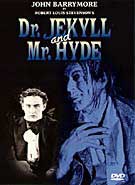 |
|

|
Once again I find myself pondering if I truly need to recap the plot of what should be standard reading in the realm of fantastic literature, a plot that has been used as the basis for at least half a hundred movies. Once again I find myself erring on the side of safety: In Victorian England, the saintly Dr. Henry Jekyll (John Barrymore) takes time out from ministering to the poor to attend a dinner party, where he is led into temptation by the venal Sir George Carew (Brandon Hurst). Though Jekyll successfully resists the advances of a striking Music Hall dancer (Nita Naldi), he finds his darker urges have been awakened, and he becomes obsessed with the idea of separating his good and bad sides, that he may experience the sensations he desires, yet keep his immortal soul spotless clean. Thus he creates a formula which transforms him physically into Mr. Edward Hyde, a sociopathic libertine. Once awakened, though, the beast will not easily rest, as Jekyll soon finds himself transforming without benefit of his formula. A bit of a legend has grown over the years about John Barrymore accomplishing the role of Hyde without benefit of makeup - sorry, false. He does accomplish that first transformation by simple dint of ACTING!, however. That said, it's a joy to watch Barrymore at work, representing as he does a cusp between the florid yet rigid acting standard of the early twentieth century and the growing naturalist movement that gave rise to Method Acting. His Hyde is often genuinely frightening, and his Jekyll suitably tormented. Barrymore is also backed by a fine group of actors. Unfortunately, the film itself tends to drag... the intertitles are rather far apart, and though the contemporary audience may have been adept at filling in the spaces, the modern viewer simply finds himself wondering what the heck the characters are talking about. In the main, though, it's a fairly faithful retelling of Robert Louis Stevenson's novella.
It's in the viewing of movies such as this that you begin to truly appreciate the accomplishment of film restorations, as in Lumivision's version of the 1925 The Lost World. This Jekyll, from the Blackhawk Films archive, is likely in the best shape possible without such a major effort. The image is speckled and lined throughout, with the contrast vacillating madly between too dark and too light in the same scene. Though the picture is never rendered unwatchable, it does take a degree of patience and forgiveness to get through. Effort was put forth to recreate the tinting effects used in the original presentation, with sepia tones for interiors, a blue wash for nighttime scenes and the infrequent daytime shots in plain black and white. The score is a fairly accurate blend of organ and piano - your better silent movie houses had bizarre instruments that were a combination of the two.
The interactive menu is effective and even somewhat clever in its offering access to the movie's thirteen chapters - the cursor becomes a ghostly, clutching hand. The only other extra is a historically interesting nickelodeon reel from 1911 showing the transformation of Jekyll into Hyde. Dr. Freex, 3/27/00 |
|
|
|
|

